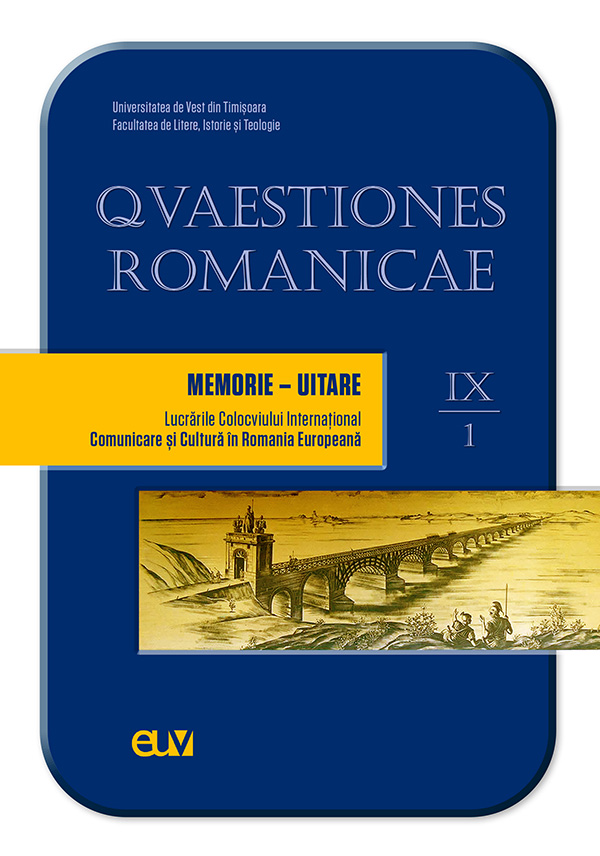Travaliul memoriei la Sfântul Augustin şi Mircea Cărtărescu
Abstract: (The Labour of Memory in Saint Augustine and Mircea Cărtărescu) Writings strongly marked by the labour of memory (the appeal to memory being a genetic, internal principle of theirs), The Confessions of St. Augustine and the fictional autobiography Orbitor bring face to face two models of subjectivity at odds, the model of the birth of modern subjectivity and its postmodern decline. The mirroring of these models aims at mapping the interiority at the extremities of its history, in the point of origin and in the end, the Augustinian memory containing in germs the drama of modern subjectivity, while the Cărtărescian memory takes to the extreme this drama projecting itself in the field of postmodern relativism. Described under the sign of a radical cleavage (shattering, traumatic), the one between the abyss of human consciousness and the gaze of God (in Augustine), respectively the cleaved structure of the self projected as a double (in Mircea Cărtărescu), the interiors accessed by descending into the nebula of memory lead to opposite revelations, such as the Augustinian remembrance of God and the chimerical proliferation of the simulacrum. Metaphor central to both authors, the vast inner palaces of memory become the meeting place of the sacred in the conversion scenario, just as, at the other historical end of subjectivity, this place can only be the expression of nostalgia and emptiness. Conceived as an initiatory, ritualized path, the path to God or to the Self passes, for both authors, through the territory of memory, and its mapping is representative for the construction of specific models of interiority and identity. The double image of memory, at the end of antiquity and in postmodernism (therefore, at the end of modernity or neomodernity), is relevant for the path of Western subjectivity, of thinking about the subject’s relationship with the Self, activated through the process of recollection.
Keywords: subjectivity, cleavage, simulacrum, Self, labour of memory.
Rezumat: Scriituri puternic marcate de travaliul memoriei (recursul la memorie fiind chiar un principiu genetic, intern al acestora), Confesiunile Sfântului Augustin şi autobiografia ficţională Orbitor aduc faţă în faţă două modele ale subiectivităţii aflate la antipozi, modelul naşterii subiectivităţii moderne şi cel al declinului său postmodern. Punerea în oglindă a acestor modele urmăreşte cartografierea interiorităţii la extremităţile istoriei sale, în punctul de origine şi în cel de final, memoria augustiniană conţinând în germene drama subiectivităţii moderne, în timp ce memoria cărtăresciană duce la extremă drama aceasta proiectându-se în câmpul relativismului postmodern. Descrise sub semnul unui clivaj radical (cutremurător, traumatic), cel dintre abisul conştiinţei umane şi privirea lui Dumnezeu (la Augustin), respectiv structura clivată a Eului proiectată ca dublu (la Mircea Cărtărescu), interiorităţile accesate prin descinderea în nebuloasa memoriei conduc la revelaţii opuse, precum augustiniana reamintire de Dumnezeu şi himerica proliferare a simulacrului. Metaforă centrală la ambii autori, vastele palate interioare ale memoriei devin locul întâlnirii cu sacrul în scenariul convertirii, după cum, la celălalt capăt istoric al subiectivităţii, locul acesta nu mai poate fi decât expresia nostalgiei şi a vacuităţii. Conceput ca un parcurs iniţiatic, ritualizat, drumul spre Dumnezeu sau spre Sine trece, la ambii autori, prin teritoriul memoriei, iar cartografierea acesteia este reprezentativă pentru construcţia unor modele specifice ale interiorităţii şi identităţii. Dubla imagine a memoriei, la finalul antichităţii şi în postmodernism (aşadar, la finalul modernităţii sau neomodernităţii), este relevantă pentru traseul subiectivităţii occidentale, al gândirii raportului subiectului cu Sine, activat prin intermediul procesului de rememorare.
Cuvinte-cheie: subiectivitate, clivaj, simulacru, Sine, travaliul memoriei.
